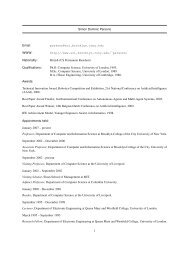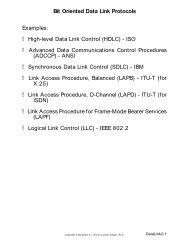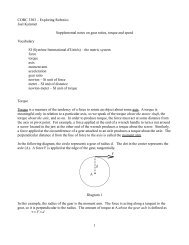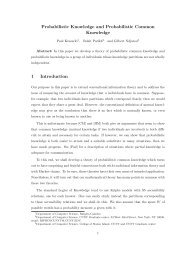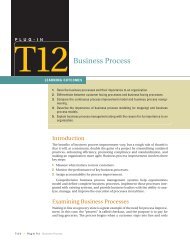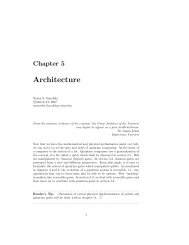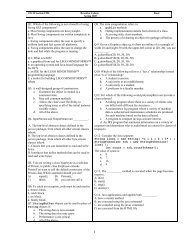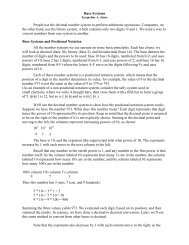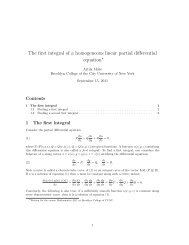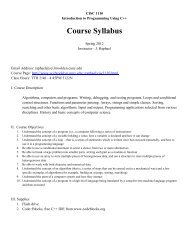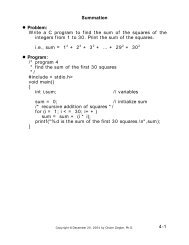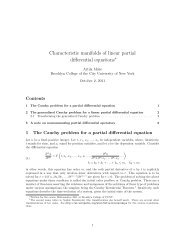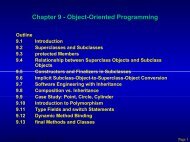*302 Greig and Others v Insole and Others 1977 G. No. 22461977 J ...
*302 Greig and Others v Insole and Others 1977 G. No. 22461977 J ...
*302 Greig and Others v Insole and Others 1977 G. No. 22461977 J ...
You also want an ePaper? Increase the reach of your titles
YUMPU automatically turns print PDFs into web optimized ePapers that Google loves.
[1978] 1 W.L.R. 302 Page 47<br />
[1978] 1 W.L.R. 302 [1978] 3 All E.R. 449 (1978) 122 S.J. 162 [1978] 1 W.L.R. 302 [1978] 3 All E.R. 449 (1978)<br />
122 S.J. 162<br />
(Cite as: [1978] 1 W.L.R. 302)<br />
tion than those who had not <strong>and</strong> would thus have<br />
been able to play county cricket, whereas those who<br />
had not yet signed would not have been. I think I<br />
said that this could create in the close-knit world of<br />
cricket — which is essentially a game where you<br />
have to play as a team <strong>and</strong> live together — a reasonably<br />
certain amount of friction which could not<br />
at all be in the best interests of either county or test<br />
cricket, had there not been a retroactive ban.”<br />
I appreciate the force of the point that if<br />
the ICC ban was to be introduced at all, it might<br />
have been thought desirable to make it retrospective,<br />
in the sense already indicated, in order to lend<br />
credibility to the deterrent afforded by it <strong>and</strong> to<br />
make that deterrent appear equitable as between the<br />
players involved. However, this particular possible<br />
*354 advantage of introducing a<br />
ban in retrospective form had to be set against what<br />
are, in my judgment, an overwhelming number of<br />
factors going the other way.<br />
First <strong>and</strong> foremost, to deprive, by a form of retrospective<br />
legislation, a professional cricketer of the<br />
opportunity of making his living in a very important<br />
field of his professional life, is in my judgment<br />
prima facie both a serious <strong>and</strong> unjust step to take.<br />
Though many persons on the defendants' side have<br />
taken a contrary view, I have already indicated the<br />
reasons why I do not think that, on any fair <strong>and</strong> objective<br />
basis, players who had already contracted<br />
with World Series Cricket can be said to have deserved<br />
the sanction that was imposed against them,<br />
<strong>and</strong> if they did not deserve it, it is no answer to say<br />
that many of them may have expected it.<br />
Secondly, the public will be deprived of a great<br />
deal of pleasure, if it is to be deprived of the opportunity<br />
of watching these talented cricketers play in<br />
those many official Test Matches which do not<br />
clash with World Series Cricket matches, <strong>and</strong> for<br />
which they would otherwise be available. Of the 13<br />
Test series planned for the next three years, it is<br />
probable that seven will not clash with World<br />
Series Cricket matches at all, so that World Series<br />
cricketers will be available to play in them. The<br />
ICC ban by disqualifying them from playing even<br />
in these matches would be aggravating any deprivation<br />
that World Series Cricket might already be<br />
causing the public in the various Test-playing countries.<br />
Thirdly, if, as is implicity alleged in the defendants'<br />
pleadings, the absence of such players from official<br />
Test <strong>and</strong> other first class matches will affect gate<br />
receipts, a rigid rule preventing the selectors of a<br />
particular country from selecting a particular player<br />
who is available to play in a Test Match, merely because<br />
he has played for World Series Cricket, is<br />
likely to result in an actual diminution of the receipts<br />
of such Test Matches. The plaintiffs' counsel<br />
expressly recognised that Test selectors, in exercise<br />
of their discretionary functions, will always be entitled<br />
to prefer a player who has not elected to play<br />
for a private promoter to one who has. <strong>No</strong> one suggested<br />
that a cricketer's involvement with World<br />
Series Cricket would be an improper factor for such<br />
selectors to take into account. This, however, is a<br />
very different matter from placing the selectors under<br />
inflexible restrictions in regard to their field of<br />
selection. Mr. Short of the West Indies, a frank <strong>and</strong><br />
excellent witness, agreed under cross-examination<br />
that the West Indies would be making a<br />
“considerable sacrifice” in denying themselves the<br />
opportunity of playing World Series Cricket players,<br />
when they were available. All the other Testplaying<br />
countries would be making a similar sacrifice.<br />
Mr. Short said, in effect, that it was necessary<br />
to make that sacrifice to safeguard the present <strong>and</strong><br />
long term interests of international cricket. With all<br />
respect to him <strong>and</strong> the other witnesses called on behalf<br />
of the defendants who said much the same<br />
thing, I do not think that they had given sufficient<br />
thought to the specific positive benefits, if any, to<br />
be derived from a ban. In my judgment the positive<br />
benefits that might follow from a retrospective ban<br />
of the nature introduced by the ICC at its meeting<br />
of July 26, <strong>1977</strong>, are, at most, speculative <strong>and</strong> not<br />
nearly sufficient to outweigh the certain injustices<br />
to the players involved <strong>and</strong> the certain detriment to<br />
the world public interested in cricket, which would<br />
© 2011 Thomson Reuters.



